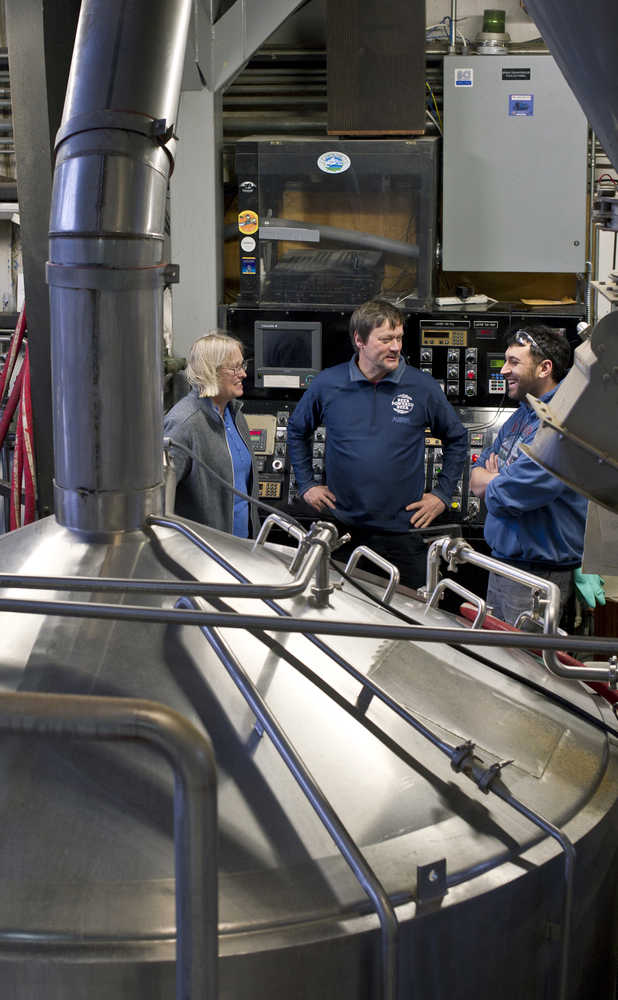Alaskan Brewing Co. isn’t selling out.
It isn’t closing down.
It isn’t moving to the Lower 48, changing its name or owners.
In an interview Thursday, brewery founders Geoff and Marcy Larson said their plan is for the brewery to resemble another Juneau institution, the Annex Creek hydroelectric plant, which turns 100 years old next month.
“We want to keep this here a hundred years — that’s the goal,” Marcy said.
At the start of another Alaska Beer Week, restating that goal isn’t PR puffery. In 2015, the United States passed a notable statistical hurdle: There are more than 4,200 craft breweries nationwide, the most in U.S. history. Until last year, the record hadn’t budged since 1873, when 4,131 breweries operated. When Alaskan opened in December 1986, it was one of only 67 in the United States.
Now, craft beer — which comes from smaller, independent breweries — makes up 11 percent of all beer sold nationwide. Most of the rest comes from four companies: Heineken, Carlsberg, Anheuser-Busch InBev, and SABMiller, which combined sell three-quarters of the beer in the United States.
While all four remain profitable (and InBev is seeking to buy SABMiller), published sales figures indicate those four giants are seeing flat or declining sales in their biggest markets.
That has them looking at craft beer, a growing sector.
In five days in late December, InBev bought three prominent craft breweries, adding them to four others it previously acquired in 2015. InBev also owns a 32 percent share of Craft Brewers Alliance Inc., a company that owns the Kona (Hawaii), Goose Island (Chicago), Widmer (Portland) and Redhook (Washington) breweries.
“There are a lot of breweries falling by the wayside and a lot of breweries getting bought out,” Geoff said.
He and Marcy each said Alaskan receives about a call per week from people interested — or who say they’re interested — in buying the company or the brewery.
“We don’t ever return calls, we won’t do anything,” Geoff said.
They refuse to hold meetings on the subject and normally won’t even talk about it for the simple reason that if they ever even heard someone make a serious proposal, that would become a rumor or a story.
Holding a bottle of Alaskan Amber, Geoff pointed to its label. “I think the label says it all,” he said. “We’re from Alaska. … We’re not going to relocate from Juneau at this stage. I don’t see it.”
At a recent craft beer meeting in Aspen, Colorado, Geoff said he realized that “we’re part of the old guard of our industry.” He laughed, then continued: “I guess we are old now.”
The couple that started the brewery — with the help of 88 investors — have no plans to retire anytime soon, but they do have a succession plan in place to make that 100-year goal possible.
Three years ago, they began an employee stock ownership plan that allows employees to buy shares in the company. While Marcy and Geoff still own a majority of the company, employees now own 10 percent, and that share is rising.
Alaskan Brewing itself is growing as well, “rapidly,” the Larsons said.
With office space at a premium in its Lemon Creek location, the brewery is now renting offices from the next-door City and Borough of Juneau public works building. A new variety-pack assembly line is manufacturing cartons for shipment across the United States.
The newest seasonal beer, Hop Turn, is making its way across the country, and a jalapeno IPA is slated for release next month.
Later this year, the brewery will celebrate its 30th anniversary, and worried drinkers can rest assured: That anniversary will be celebrated in Juneau.

